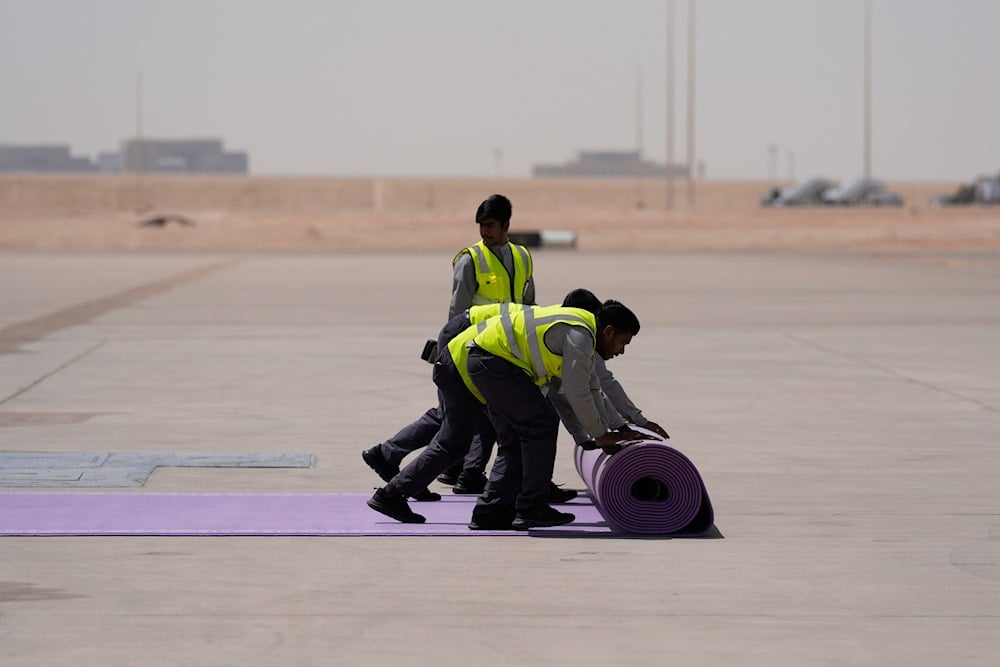Saudi Arabia cuts expat salary premiums amid Vision 2030 plan
Saudi Arabia is scaling back expat salary premiums as Vision 2030 pivots spending from megaprojects to sectors like AI and mining, reshaping recruitment dynamics across key industries.
-

Workers roll the red carpet as President Donald Trump arrives on Air Force One at King Khalid International Airport Royal Terminal in Riyadh, Saudi Arabia, Tuesday, May 13, 2025 (AP)
Saudi companies, driven by government spending cuts and a reordering of national economic priorities, are now scaling back the generous salary premiums that were once instrumental in attracting top foreign talent to key sectors such as construction and manufacturing.
Saudi Arabia, the world's top oil exporter, is more than halfway through implementing its Vision 2030 plan to diversify its economy away from oil, create jobs, and develop new sectors like tourism and mining.
In pursuing its long-term plan, the kingdom has made massive investments in multi-billion-dollar megaprojects, which have vastly increased demand for high-skilled foreign workers, even as it has struggled with significant execution challenges and project delays.
According to two sources, foreign recruits should no longer expect to negotiate the 40% or higher salary premiums, which sometimes even doubled their existing salaries and were common earlier this decade, as current offers are far more restrained.
Magdy Al Zein, the managing director at recruiter Boyden, explained that with the region's largest economy rationalizing its spending while simultaneously facing a huge supply of candidates who are very open to moving to the region, the result is that employers are rethinking their compensation packages, a shift which he confirmed has definitely happened.
Saudi Arabia looks to AI, logistics as its backup
Saudi Arabia is shifting its economic strategy as its Public Investment Fund (PIF), worth $925 billion, reallocates investments away from costly and delayed megaprojects, such as NEOM, toward sectors like AI and mining for better returns. This pivot, combined with lower oil prices and a resulting budget deficit, has slowed project activity and forced a rationalization of spending.
Consequently, recruitment for these megaprojects has slowed significantly. The once-common practice of luring foreign talent with salary premiums of 40% or more has ended, with offers now far more restrained and average pay differing from the UAE by only 5-8%. Employers are now negotiating salaries more aggressively and implementing cost-conscious measures.
This makes recruiting from the UAE particularly challenging, as high-skilled workers are often drawn to its more established liberal lifestyle, international schools, and healthcare, requiring a significant premium to be convinced to move to Saudi Arabia.
Work competition gets tighter
Saudi Arabia, estimated to grow 4.4% this year, remains attractive to candidates outside the region where job markets are tighter and growth is slower, a position reinforced by government reforms that are accelerating initiatives to boost the proportion of citizens in the private sector, thereby increasing competition and expanding the pool of applicants.
This dynamic is reflected in unemployment among Saudi citizens falling to a historic low and the number of Saudis in the private sector growing by 31% between 2016 and the second quarter of this year, a trend that has contributed to a more measured approach to compensation. Louise Knutsson, CEO of Matches Talent in Dubai, told Reuters that packages are now anchored to data, performance, and real market benchmarks, a shift that may feel like a contraction but signals market maturity.
To successfully attract top talent, Knutsson added, companies will need to offer predictable packages that reflect living costs, provide a balanced lifestyle for families, and connect to the clear, large-scale purpose of what is being built in the kingdom.

 3 Min Read
3 Min Read










